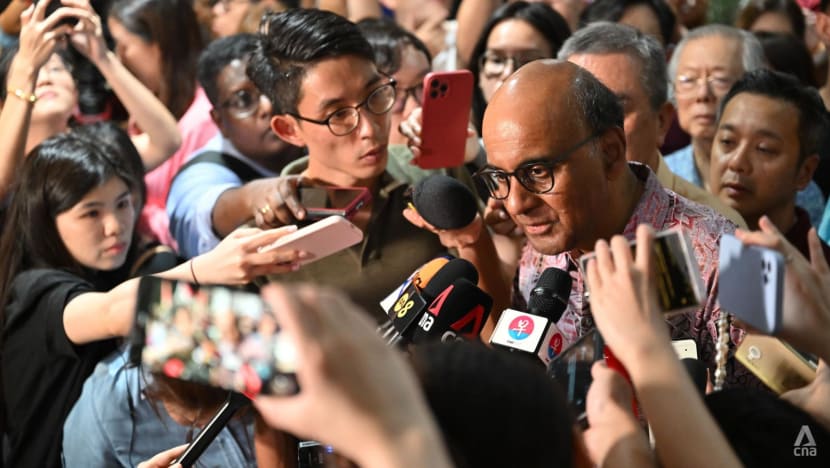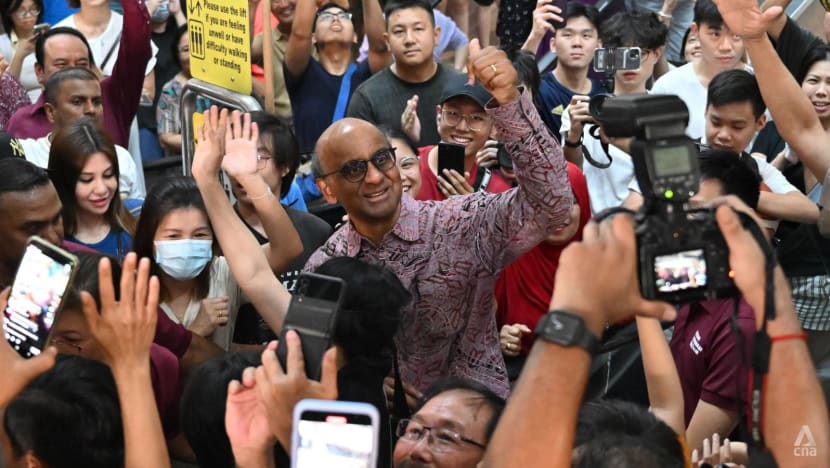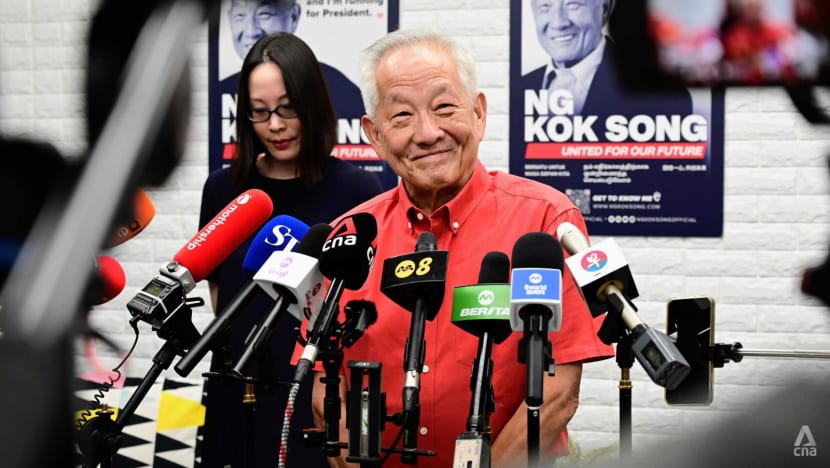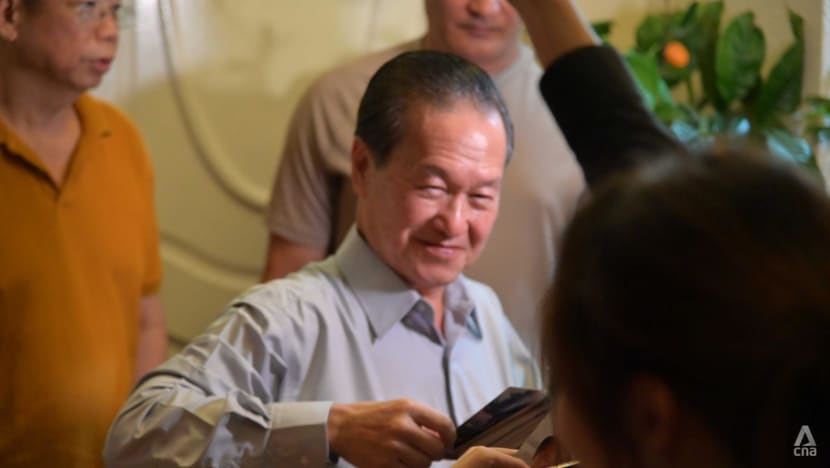'Rather unexpected': Analysts surprised at Tharman’s margin of victory in Singapore Presidential Election
Former Senior Minister Tharman Shanmugaratnam was elected Singapore’s ninth President with more than 70 per cent of the votes.

Tharman Shanmugaratnam during a doorstop at Taman Jurong Market and Food Centre on Sep 1, 2023. (Photo: CNA/Jeremy Long)
- Some political analysts say the huge winning margin is unexpected, even though they acknowledged many were hopeful that Tharman would win
- Tharman's vote share reflects his consistent track record and popularity across the political spectrum, say analysts
- Analysts also point to Ng Kok Song's lack of public exposure and Tan Kin Lian's controversial statements as reasons for their loss
SINGAPORE: While Mr Tharman Shanmugaratnam’s win in Singapore's Presidential Election was expected, the huge margin of victory left political analysts surprised.
Mr Tharman, a former Senior Minister who was in politics for more than two decades, was elected Singapore’s ninth President in a landslide victory, winning 70.40 per cent of votes after four-and-a-half hours of counting.
About 2.5 million Singaporeans voted in the election on Friday (Sep 1).
Former GIC chief investment officer Ng Kok Song garnered 15.72 per cent of votes, while former NTUC Income chief executive Tan Kin Lian received 13.88 per cent of votes.
The final result closely mirrored the sample count announced by the Elections Department late on Friday night.
The sample count showed that Mr Tharman had garnered 70 per cent of votes, while Mr Ng and Mr Tan received 16 per cent and 14 per cent respectively.
“MIND-BOGGLING” RESULTS
Speaking to CNA on a live broadcast after the sample count result, Associate Professor Eugene Tan from Singapore Management University (SMU) called the Presidential Election sample count result “mind-boggling”, with Mr Tharman’s total vote share beating the combined total of votes for Mr Tan and Mr Ng.
He noted that the result was similar to Mr Tharman's performance during General Elections, when he consistently polled between 70 per cent and 75 per cent in Jurong Group Representation Constituency (GRC).
Dr Felix Tan, a political analyst from the Nanyang Technological University (NTU), also expressed his surprise at both the sample count result and the final result.
“I think there were many people who were hopeful that Tharman would win, but winning by this huge margin ... I think it’s rather unexpected and it’s quite a surprise. A pleasant surprise for some,” he said.
Highlighting the focus on issues of “establishment versus anti-establishment” throughout the campaigning period, Dr Tan explained that one would have felt that “perhaps the support for Mr Tharman might have lost some ground but it seems like it has not”.
In fact, it has "pushed his support even higher", he added.
Other analysts, on the other hand, did not find the results unexpected. Dr Woo Jun Jie, senior research fellow from the Institute of Policy Studies (IPS), said he was “not at all” surprised by Mr Tharman’s resounding victory.
Associate Professor Chong Ja Ian from the National University of Singapore (NUS) added that Tharman was "popular going into the election" and he had "two weak opponents".
"Ng Kok Song is a relative unknown; Tan Kin Lian has a record for making controversial statements," he said.
"The results are not too far off Tharman's historical record leading Jurong GRC, and GRCs are supposed to be drawn to reflect the country demographically. So yes, the results are unsurprising."
Assoc Prof Chong, who teaches political science, also highlighted that the results show that Singaporeans "can and will support minority candidates, even for high office". They just have to be "strong candidates like everyone else".

STRONG VOTE SHARE REFLECTS THARMAN’S POPULARITY
Dr Woo said Mr Tharman’s strong vote share “reflects not just his public popularity but voters’ trust in his ability to carry out his duties as President”.
This comes from his experience as Deputy Prime Minister from 2011 to 2019, as well as his time as Finance Minister from 2007 to 2015, which gave him top-level policy experience, Dr Woo added.
NTU's Dr Tan highlighted Mr Tharman’s consistent campaigning strategy, and that he didn’t “react” to what other candidates may have said.
“He stuck to his slogan, which is ‘respect for all’. And that was the most important, because at the end of the day, it’s about consistency. It’s about what you believe and it’s about who you are,” he said.
“And I think, the Presidential (Election) boils down to character and integrity ... Mr Tharman has shown it.”
While the "huge margin of victory reflects how Singaporeans feel about Tharman", Dr Tan said "this does not always mean that the President has to be antagonistic with the government ... especially when the President has numerous constraints".
"However, having such a strong legitimacy would also give Tharman a much stronger mandate to question the government if necessary. After all, the government did not even come close to the vote share that Tharman received," he added.
SMU’s Assoc Prof Tan said voters had put aside their differences to usher Mr Tharman to the Istana, adding: “This is popularity across the island. One would say he pulled votes from across the entire political spectrum, notwithstanding that this is not a political contest.”
Assoc Prof Tan also noted that Singapore is undergoing a leadership change at a political level. Prime Minister Lee Hsien Loong has said he is preparing to hand over to the fourth-generation (4G) team, led by Deputy Prime Minister Lawrence Wong.
“Someone like Mr Tharman, with his stature, his international standing, and with that solid backing of Singaporeans, will be able to help Singapore (in a) very positive (way into the) future,” Assoc Prof Tan said.
At the same time, Mr Tharman’s personality, track record and campaign messaging were supplemented by the “huge swing to him in the middle ground”, said Dr Mustafa Izzuddin, senior international affairs analyst at Solaris Strategies Singapore.
This swing was due to the polarising contest that arose when various opposition figures expressed support for fellow candidate Mr Tan, he suggested.
Mr Tan received support from Peoples Voice's Lim Tean, People's Power Party's Goh Meng Seng, chairman of Progress Singapore Party Dr Tan Cheng Bock, as well as Singapore Democratic Party’s Mr Tan Jee Say. Dr Tan said he was supporting Mr Tan Kin Lian in a "personal capacity".
“It had a positive spillover on Tharman. It jolted the middle ground to err on the side of caution, and vote pragmatically and rationally in this election. And therefore, vote for the person based on two factors: Relatability and familiarity,” added Dr Mustafa.

NG KOK SONG LACKED PUBLIC EXPOSURE
However, Mr Tan’s support from opposition party members had a “negative spillover effect” on Mr Ng’s campaign, said Dr Mustafa.
Mr Ng was relying quite a bit on the middle ground to get him elected, he explained.
“If the middle ground had shifted considerably to Tharman, he’s only left a segment of the middle ground voting for him, and that’s why you saw him having the percentage of vote that he has,” he added.
“And Tan Kin Lian obviously got the bulk, if not all, of the vote from hardcore opposition supporters.”
Analysts also pointed out that Mr Ng was an unknown figure to the general public until he decided to run for the presidency.
IPS’ Dr Woo said Mr Ng lacked the public exposure that Mr Tharman had, despite having spent 45 years in the public service.
Moreover, the campaigning period was "very short", so "a lot rides on public impressions going in", added NUS' Assoc Prof Chong.
Mr Ng had to "fight to get people to recognise him", but Mr Tan had "name recognition".
However, Assoc Prof Chong pointed out that "a lot" of talk about Mr Tan was "negative" and that he "reinforced that view" such as with his comments on women and race.
Nonetheless, Mr Tan's name recognition and endorsement by known opposition politicians, coupled with the public's "relative unfamiliarity" with Mr Ng probably allowed Mr Tan to perform better than in 2011's Presidential Election, the associate professor added.

TAN KIN LIAN’S INDEPENDENCE, SOCIAL MEDIA POSTS CAME UNDER FIRE
Voters may have been put off Mr Tan as there were “too (many) oppositional forces going on (in) his candidacy”, said Dr Tan, referring to the second-time presidential candidate’s support from opposition party members.
“I think that might have pushed people away from voting for Tan Kin Lian because for all the (times) that he talked about independence, he’s not independent at all.”
Mr Tan received less than 5 per cent of the votes in the 2011 Presidential Election and lost his deposit.
However, Dr Tan believes Mr Tan managed to take back his election deposit this time as there was only “one huge, really strong, popular candidate” in this election.
In comparison, he said there were “two very strong candidates” in Dr Tan Cheng Bock and Dr Tony Tan in the 2011 Presidential Election.
SMU’s Assoc Prof Tan noted that Mr Tan got almost three times more support this year than in 2011. He expressed his concern that this happened despite Mr Tan “running a campaign that – at times – didn’t put forth accurately what the President did, with views that certain segments of the population would regard as misogynist, racist, even nativist”.
During the Presidential Election campaign, Mr Tan also came under fire for his social media posts on “pretty girls”, which he subsequently apologised for.
Dr Woo said some voters may have been put off by these posts, while some may not have been sufficiently convinced that his background in insurance would provide him with the expertise needed in public finance matters.
“I am, however, a little surprised by Tan Kin Lian’s low vote share, given the strong support that he had received from various opposition parties,” he added.
REJECTED VOTES, DECREASE IN VOTER TURNOUT
This year, there were 50,152 spoilt votes, or about 2 per cent of the total vote count. While this was slightly higher than the number of spoilt votes – 37,849 – in the 2011 Presidential Election, analysts didn’t find the figure to be significant.
NTU’s Dr Tan said the number of spoilt votes “generally do not make much of a difference” especially when Mr Tharman’s vote share was “so high”.
He added that overall, as much as there were some who had argued for a “protest against the protest vote”, that “did not really materialise”.
SMU’s Assoc Prof Tan said this was not “too significant an increase”, and that people should not be “too bothered by what seems to be a slightly larger absolute number of spoilt votes”.
However, he acknowledged that it appeared some voters “felt that despite the three candidates, there wasn’t one that met their requirements”.
“It could turn on a variety of factors, ranging from whether there were concerns about their prior affiliations … whether (they liked) Mr Tan Kin Lian (with) the sort of association (he had) with the opposition, (or) whether race could have played a part,” he said.
Editor's note: This article has been updated to remove references to the voter turnout in the 2011 Presidential Election and Dr Felix Tan's assessment of its significance versus 2023. The information on the 2011 turnout was incorrect. We apologise for the error.













.jpg?itok=tRvzUns2)






